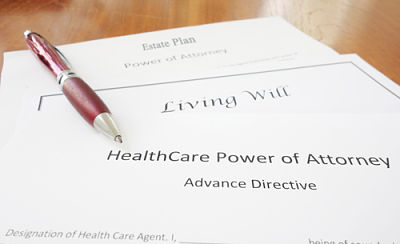
Picture of living will and power of attorney paperwork.
Advance Directives
What kind of medical care would you want if you were too ill or hurt to express your wishes?
Advance Directives are legal documents that allow you to convey your decisions about end-of-life care ahead of time. They provide a way for you to communicate your wishes to family, friends and health care professionals and to avoid confusion later on.
Advance Directives and Do Not Resuscitate Orders:
You have the right to make all decisions that affect your health care. But what if you become unable to make those decisions? Then you will have to rely on others to make the right decisions for you - right? WRONG. You have the right to decide what kinds of treatment you want to be given if you become incapacitated.
What is an Advance Directive:
An Advance Directive tells your doctor what kind of care you would like to have if you become unable to make medical decisions (if you are in a coma, for example). If you are admitted to the hospital, the hospital staff will ask if you have an advance directive. If you have an advance directive, hospital staff will request a copy. If you do not have an advance directive, you will receive information and the hospital staff will assist you in obtaining your advance directive by contacting the South Carolina Ombudsman at 1-866-845-1550.
A good advance directive describes the kind of treatment you would want depending on how sick you are. For example, the directives would describe what kind of care you want if you have an illness that you are unlikely to recover from, or if you are permanently unconscious. Advance Directives usually tell your doctor that you don't want certain kinds of treatment. However, they can also say that you want a certain treatment no matter how ill you are.
Advance Directives Can Take Many Forms:
Living Will: A living will is one type of advance directive. It is a written, legal document that describes the kind of medical treatments or life-sustaining treatments you would want if you were seriously or terminally ill. A living will doesn't let you select someone to make decisions for you.
Durable Power of Attorney: A durable power of attorney (DPA) for health care is another kind of advance directive. A DPA states whom you have chosen to make health care decisions for you if you are unable to make your own health care decisions. It becomes active any time you are unconscious or unable to make medical decisions. You guide the decisions by including specific rules or limitations in your health care Power of Attorney.
Do Not Resuscitate Order: A do not resuscitate (DNR) order is another kind of advance directive. A DNR is a request not to have cardiopulmonary resuscitation (CPR) if your heart stops or if you stop breathing. You can use an advance directive form or tell your doctor that you don't want to be resuscitated. In this case, a DNR order is put in your medical chart by your doctor.
Creating Advance Directives...
Any person 18 years of age or older can prepare an advance directive unless the patient is pregnant.
People who are seriously or terminally ill are more likely to have an advance directive. However, even if you are in good health, you might want to consider writing an advance directive. An accident or serious illness can happen suddenly.
Advance Directives and Living Wills do not have to be complicated legal documents. They can be short, simple statements about what you want done or not done if you can't speak for yourself. Remember, anything you write by yourself or with a computer software package should follow your state laws. You may also want to have what you have written reviewed by your doctor and/or lawyer to make sure your directives are understood exactly as you intended. When you are satisfied with your directives, the orders should be notarized if possible, and copies should be given to your family and your doctor.
You may change or cancel your advance directive at any time, as long as you are considered of sound mind to do so. Your changes must be made, signed and notarized according to the laws in your state. Make sure that your doctor and any family members who knew about your directives are also aware that you have changed them. Be sure you are clearly understood by everyone you have told.
 If you have any questions about Advance Directives or would like more information, please contact our Director of Social Services, Paula Wall, by phone at 803-632-3311, Ext. 240, or by email at paulaw@achospital.org.
If you have any questions about Advance Directives or would like more information, please contact our Director of Social Services, Paula Wall, by phone at 803-632-3311, Ext. 240, or by email at paulaw@achospital.org.